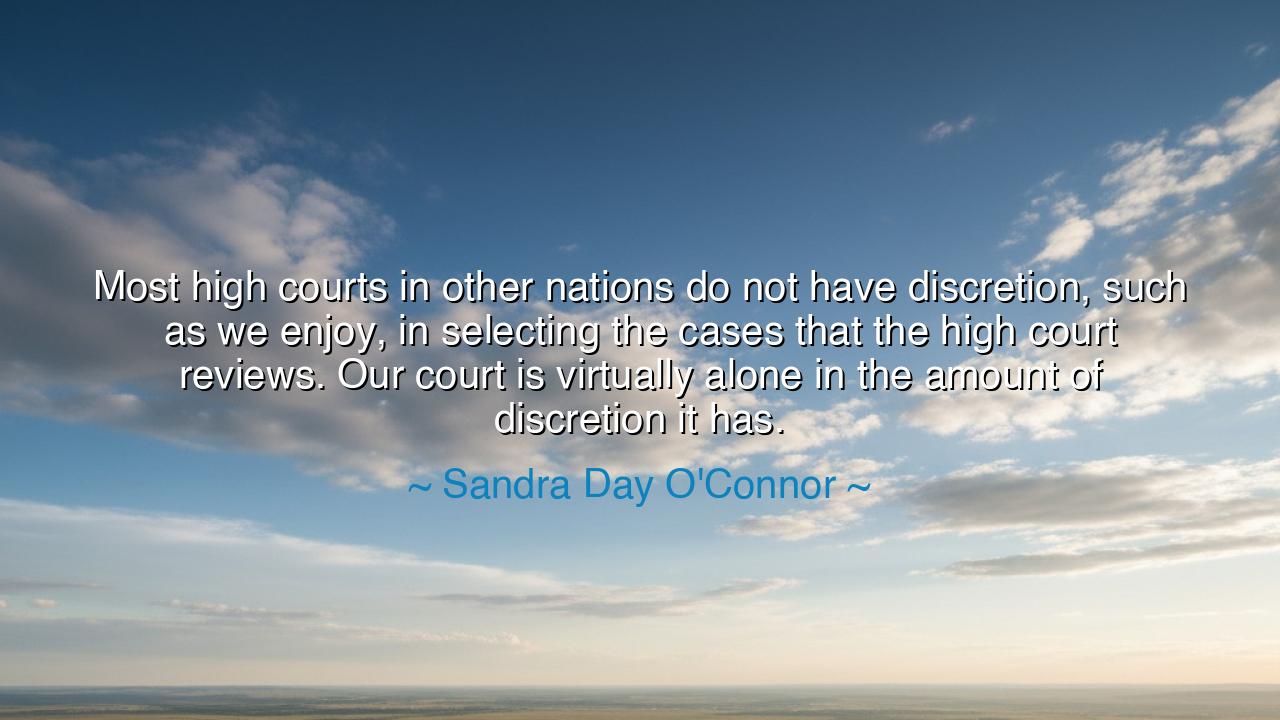
Most high courts in other nations do not have discretion, such as
Most high courts in other nations do not have discretion, such as we enjoy, in selecting the cases that the high court reviews. Our court is virtually alone in the amount of discretion it has.






In the discerning and reflective words of Sandra Day O’Connor, the first woman to serve upon the United States Supreme Court, we find a meditation on both power and restraint: “Most high courts in other nations do not have discretion, such as we enjoy, in selecting the cases that the high court reviews. Our court is virtually alone in the amount of discretion it has.” These words, spoken by a justice whose wisdom shaped the law of her time, remind us that freedom—even in judgment—is both a privilege and a burden. For with discretion comes responsibility, and with power comes the sacred duty to wield it with humility. O’Connor’s observation is not a boast, but a solemn reflection on the uniqueness of the American judicial system—its liberty to choose, and its moral obligation to choose rightly.
Sandra Day O’Connor, a woman of grace and strength, spoke these words from her deep understanding of justice earned through a lifetime of service. Born in the dust and determination of an Arizona ranch, she rose to stand among the highest guardians of the law. When she joined the Supreme Court in 1981, she became not only a symbol of progress but a voice of balance. Her words on the discretion of the Court reveal her profound awareness of how rare such power is. In most nations, high courts are compelled to hear nearly every case presented to them, their dockets overflowing, their judgments hurried. But in America, the Supreme Court has the freedom to choose its battles—to decide which questions of law shall shape the destiny of the Republic.
This discretion is a sword of two edges. On one side lies the potential for wisdom—the ability to select only those cases that matter most, to focus the light of the law upon the pressing issues of justice and liberty. On the other side lies the danger of neglect—the risk that, by choosing not to hear certain voices, the Court may allow injustices to fester unseen. O’Connor’s reflection reminds us that discretion without discernment is peril, and that true justice requires both the freedom to choose and the courage to listen. For every case not heard, every petition denied, may carry within it the cry of a citizen unseen, a principle untested, a right unguarded.
Throughout history, the exercise of discretion has defined both the greatness and the downfall of human institutions. Consider the Roman Senate of ancient times, once a body of wisdom and restraint. Its power lay not in its force but in its judgment—its ability to deliberate, to choose which matters deserved the attention of the state. Yet when its members began to use that discretion for ambition rather than duty, when they chose silence in the face of corruption, the Republic itself began to crumble. Likewise, in the hands of the American Supreme Court, discretion is both shield and mirror—it reflects the character of the nation and guards the spirit of its Constitution.
O’Connor herself embodied the balance she praised. Known for her moderate and pragmatic judgments, she often became the deciding voice in cases that shaped civil rights, women’s equality, and the separation of powers. Her approach to discretion was guided not by ideology, but by reason. She knew that the Court’s strength lay not in its authority, but in the trust of the people. “The Supreme Court,” she once said, “has no army, no treasury, and no power to enforce its own rulings. Its strength lies in the respect it commands.” Thus, her awareness of the Court’s discretion was tied to an even deeper truth: that judgment without integrity becomes tyranny, and that freedom without conscience becomes chaos.
We see the reflection of O’Connor’s wisdom not only in courts of law, but in the courts of human life. Each person, too, is given discretion—the power to choose what battles to fight, which words to speak, which paths to follow. Like the justices of the Supreme Court, we cannot attend to every grievance or right every wrong, but we can decide where our strength is most needed. The soul that exercises this inner discretion wisely builds a life of meaning; the one that acts carelessly squanders its gifts in distraction. In this way, O’Connor’s words transcend the courtroom—they become a parable of moral discernment, teaching us that the choices we make reveal who we are.
The lesson, then, is both civic and personal: wield your freedom with reverence. Whether you sit in judgment over laws or over your own actions, let your discretion be guided by principle, not by pride. Choose what is worthy of your time, your attention, and your voice. For the measure of both a court and a soul is not in how much it does, but in how wisely it decides what matters most.
So remember this, O seekers of justice and wisdom: Sandra Day O’Connor’s words remind us that freedom is not the absence of limits, but the mastery of choice. The Supreme Court stands “virtually alone” in its discretion, but so too does every human spirit stand alone before the tribunal of conscience. Let your decisions, like those of the just, be marked by humility, integrity, and courage. For in the end, the power to choose is the power to shape destiny—and the highest court is not that of man, but that of the soul.






AAdministratorAdministrator
Welcome, honored guests. Please leave a comment, we will respond soon